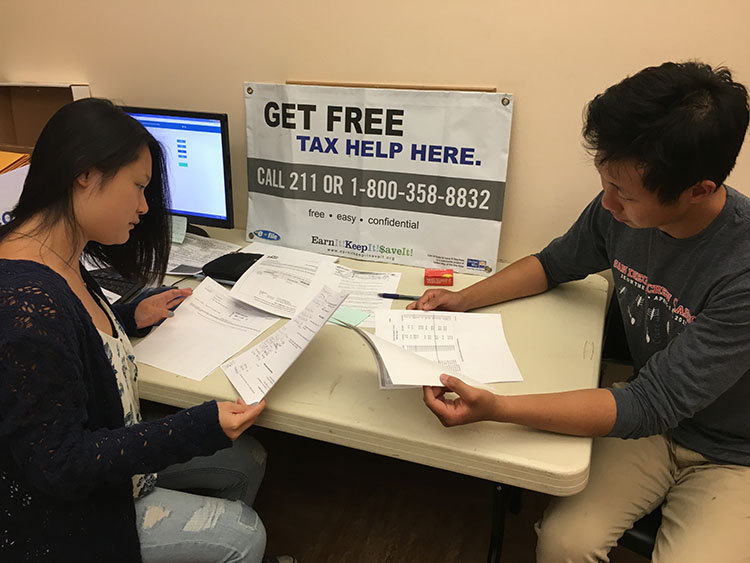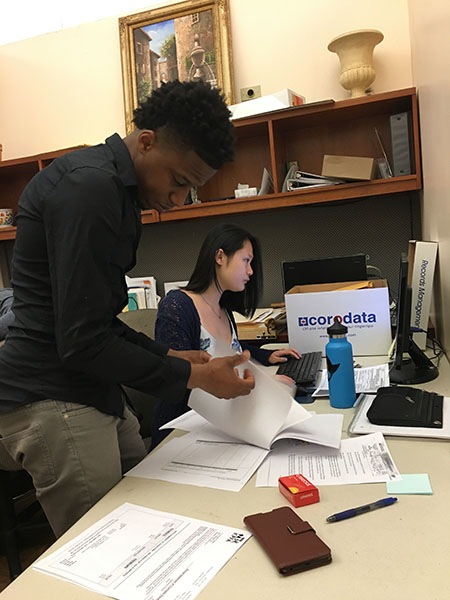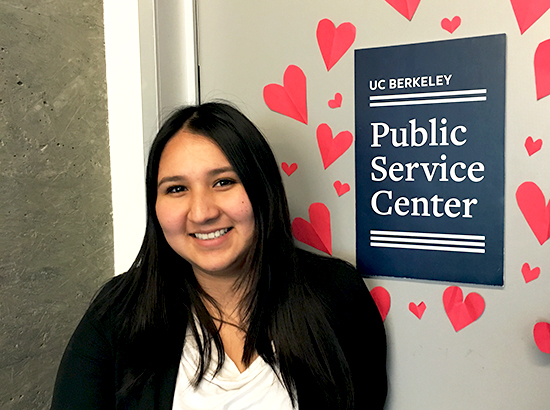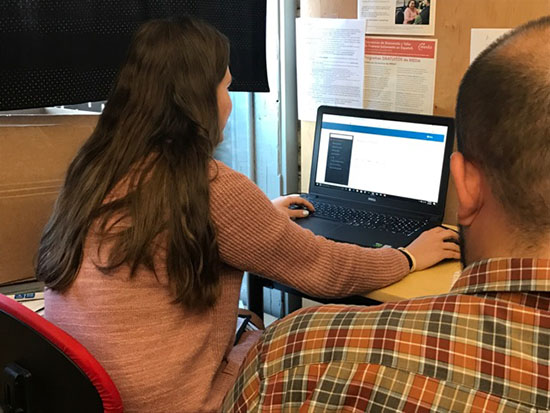Tax Day: Students prep tax returns for people in need
Dozens of students help file taxes, plan April 9 financial literacy workshop

April 5, 2017
Preparing income tax returns for others, at no cost, is “like filing for my mom,” says pre-med student Laura Rojas. From an immigrant family in Los Angeles, Rojas says her parents always struggle to pay for someone to prepare their tax returns.

At the Cooperative Center Federal Credit Union in Berkeley, VITA volunteer Rosy Wu and Toro Hill, a VITA site coordinator and member services representative at the credit union, pull together information to help morning clients. (UC Berkeley photo by Gretchen Kell)
For pre-law student Dalia Nava, it’s a way of giving back to the immigrant community she comes from in Los Angeles and to learn first-hand about the lives of the populations she intends to eventually serve with her legal expertise.
Roommates Rojas and Nava are among the growing number of Berkeley students who volunteer for VITA, the national Volunteer Income Tax Assistance program that provides free tax preparation services for low-income individuals and families. As Tax Day – April 18 – approaches, some 82 Berkeley students, up from 51 in 2016, are working for VITA in seven community centers in the East Bay and San Francisco.
“You get to know such a private side of a person, and you realize how much people have to work to make such little money, just to try to get by,” Nava says, reflecting on her experience working for clients with multiple W-2 forms – meaning they have multiple jobs – who come in for tax help right after work, and with their children, after a long, tiring day. “You see the reality of life.”
“You can learn about their days and joke around with them. It isn’t just putting numbers into computers,” adds Nava, who is the community partnership program director for Berkeley’s VITA program, which is run out of the Public Service Center on campus.

Dalia Nava, the campus’s community partnership program director for VITA. (UC Berkeley photo by Gretchen Kell)
Before they can provide services during tax season each spring, all campus volunteers for VITA can get Internal Revenue Service certification by taking a popular fall DeCal course, Volunteer Income Tax Assistance (VITA), and passing the IRS-sponsored certification exam. They have to retake the test every year if they want to come back after the first-year commitment, and many volunteers do, according to Nava.
With their knowledge of tax policies, student volunteers help their clients get the largest refund possible. According to the program’s 2016 report, Berkeley VITA ensured about $633,962 in tax credits in the 720 individual tax returns filed by the student volunteers.
Small commitment, big impact
“VITA is a lifeline for families across the East Bay,” says Jill Duerr Berrick, the Zellerbach Family Foundation Professor at the School of Social Welfare and faculty adviser for the DeCal course. According to Berrick, less than half of U.S. families have sufficient savings to replace one month’s income. These tax credits are essential to the families’ well-being, she adds, with refunds used to pay bills and reduce unsecured debt, as well as for savings.
Katherine Necochea-Tinco, a third-year business administration major and co-facilitator of the fall 2016 DeCal course, says she has volunteered with VITA three years in a row. As she realized the huge impact she could make on people’s lives with the small amount of time committed, she says she tried to convey that sense of responsibility to her more than 80 DeCal students.

Maria Jovin, a freshman in molecular and cell biology, volunteers for VITA at the Mission Economic Development Agency in San Francisco. (Photo by Dalia Nava)
“I have never imagined myself leading a class this big before,” says Necochea-Tinco, “and how much I can do with my passion to provide financial awareness and to support the community.”
For two hours a week, the course not only informs Berkeley students about tax policies and how to use tax-preparation software, but also addresses economic inequality in the communities they work with in the Bay Area. Topics range from the history of taxes to how particular tax credits can benefit low-income families. By comparing the median and range of income of the clients they serve with the federal poverty line, says Necochea-Tinco, student volunteers also learn why people in many communities need the financial support that VITA can provide.

Wu (left) and Siyuan Liu prepare to work with VITA clients at the Cooperative Center Federal Credit Union. Both are studying business on campus; Wu also has an emphasis in integrative biology. (UC Berkeley photo by Gretchen Kell)
Rojas, who aspires to study the aging brain in communities of color and is a tax preparation volunteer at the Self-Help Credit Union in West Oakland, says she volunteers for VITA because she knows the negative impact of not filing tax returns properly and, as a consequence, not getting a refund.
Rojas adds that clients find comfort in having their taxes prepared by someone who looks like them and who speaks the same language. Bilingual volunteers, especially those who speak Spanish and Mandarin, says Nava, are placed in immigrant communities that need their help the most.
Next: April 9 financial literacy conference
The VITA program also has led students to set up an annual financial literacy conference for their peers on campus. This year’s Financial Literacy and Economic Justice Conference (Flejcon) will be held on Sunday, April 9.
The first Flejcon was held in April 2016 and co-founded by VITA DeCal course facilitator Alex Mabanta. A Berkeley alumnus and currently chair of the Peace and Justice Commission for the city of Berkeley, Mabanta says he learned through work with VITA how financial literacy can play a key role in upward mobility, but that this knowledge isn’t typically taught in school. He says the 2014 University of California Undergraduate Experience Survey (UCUES) revealed the extent of financial insecurity on campus, further motivating him and other students to spread VITA knowledge. Their idea for Flejcon was a winning proposal in the Big Ideas@Berkeley competition in 2015.

Like Wu, more than 80 Berkeley students are working for VITA in seven community centers in the East Bay and San Francisco. (UC Berkeley photo by Gretchen Kell)
This year, Yiping Kao, a junior majoring in economics and co-facilitator of the current VITA DeCal course, is executive director of the 2017 conference. She says it will be a “one-stop shop” for students, with workshops to expose them to various finance-related issues they might face on campus or after graduation.
“Students might be too intimidated to take a class at the Haas School, but issues such as salary negotiation, saving for retirement and personal investment are relevant to students of all majors,” says Kao.
Flejcon – the only conference of its kind in the country – is free, features more than 30 facilitators and speakers and draws nearly 200 attendees. In 2016, the VITA/Flejcon program won a Chancellor’s Award for Public Service.
Muttika Chaturabul, the Public Service Center program manager who nominated the program for the award, says that the experience of serving as a tax preparation volunteer has impacted Berkeley students and led them to think even bigger.
“It is one of those ordinary ideas,” she says, “that translated into extraordinary reality.”